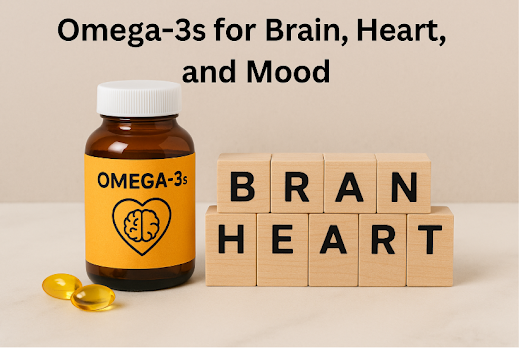Omega-3s for Brain, Heart, and Mood
Omega-3s for Brain, Heart, and Mood: Your Essential Guide to a Healthier Life
Introduction to Omega-3 Fatty Acids
Omega-3 fatty acids are essential fats that our bodies cannot produce on their own. This means we must obtain them through food or supplements. When it comes to Omega-3s for brain, heart, and mood, these nutrients are gaining more attention for their numerous health benefits. Research has shown that incorporating Omega-3s into your diet can lead to improved cognitive function, heart health, and emotional balance.
 |
| Omega-3s |
Omega-3s for Brain Health
The brain is made up of nearly 60% fat, and a significant portion of that fat includes Omega-3 fatty acids. These essential fats play a crucial role in building brain cells and maintaining cognitive function. Here are some key benefits of Omega-3s for brain health:
Memory Enhancement: Studies suggest that Omega-3s can improve memory and overall cognitive performance, potentially reducing the risk of dementia.
Mood Regulation: Regular consumption of Omega-3s may alleviate symptoms of depression and anxiety, supporting overall mental health.
Neuroprotection: Omega-3 fatty acids have anti-inflammatory properties that help protect brain cells from damage and promote healing.
If you're looking for more information on the effects of Omega-3s for brain health, you can read about recent studies on cognitive function.
Omega-3s for Heart Health
Heart disease is a major health concern globally, and Omega-3 fatty acids can play an important role in heart health. Here are some benefits of Omega-3s for your heart:
Reducing Blood Pressure: Omega-3s can help lower blood pressure levels, which is crucial for maintaining a healthy heart.
Lowering Triglycerides: Regular intake of Omega-3s has been shown to reduce triglyceride levels in the bloodstream, decreasing the risk of heart disease.
Improving Heart Rhythm: Omega-3s can help maintain a steady heartbeat, potentially reducing the risk of arrhythmias (irregular heartbeats).
For detailed insights on Omega-3s and heart health, consider checking out this resource on cardiovascular benefits.
Mood Enhancement with Omega-3s
Did you know that Omega-3 fatty acids can also contribute to a better mood? Research has shown that these essential fats can be beneficial in multiple ways:
Reducing Symptoms of Depression: Omega-3s, particularly EPA, have been linked with decreases in depressive symptoms and improved overall mood.
Anxiety Control: Studies indicate that Omega-3s may help manage anxiety levels, providing a calming effect.
Support for Mental Resilience: Omega-3s can enhance emotional support during stressful times, helping you cope better with life’s challenges.
For additional information on the impact of Omega-3s on mood, visit this article from Psychology Today.
Sources of Omega-3 Fatty Acids
Incorporating Omega-3s into your diet can be simple and enjoyable. Here are some excellent sources:
Fish: Fatty fish such as salmon, mackerel, and sardines are among the richest sources of Omega-3 fatty acids.
Flaxseeds: Ground flaxseeds or flaxseed oil are great plant-based options.
Chia Seeds: Chia seeds are versatile and can be added to smoothies, yogurt, or oatmeal.
Walnuts: Nuts are not just for snacking; walnuts are a great source of Omega-3s.
Edamame: These young soybeans are not only delicious but also packed with essential nutrients.
How Much Omega-3 Should You Consume?
The amount of Omega-3 fatty acids you need can vary based on age, sex, and health status. General guidelines recommend:
Adults: Aim for at least 250-500 mg of combined EPA and DHA (the two main types of Omega-3s found in marine sources) per day.
Pregnant Women: Pregnant women should increase their intake to support the development of the baby’s brain.
Always consult with a healthcare professional before making significant dietary changes.
Conclusion
Incorporating Omega-3s into your daily routine can offer numerous benefits for brain health, heart health, and mood enhancement. From improving cognitive function to supporting emotional well-being, these essential fatty acids are a crucial part of a balanced diet. Understanding the sources and recommended intake can help you make informed choices that promote a healthier life. Don't hesitate to share your thoughts below or ask any questions you may have about Omega-3s for brain, heart, and mood. Your journey to better health starts with simple, nutritious choices!
.png)



.png)
